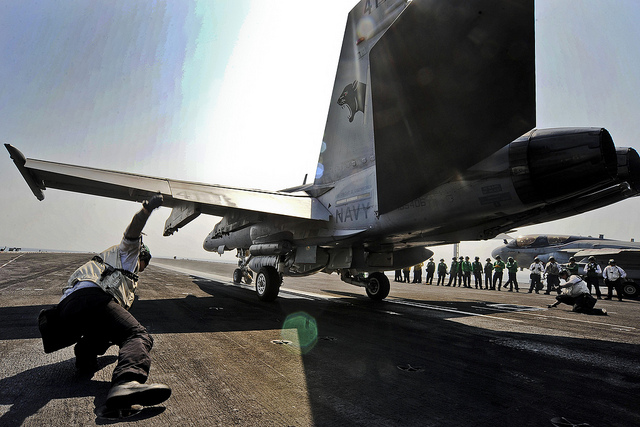Craig Whitlock in the Washington Post reports that recent U.S. airstrikes into Iraq on Islamic State targets are taking off from bases in Qatar and the UAE in addition to aircraft carriers in the Arabian Gulf, but neither government is directly admitting it at this time.
That the U.S. is using Gulf allies as their launching point for operations in Iraq is evidence of cooperation between the United States and GCC allies. However, neither government is keen to draw attention to the operations’ source location. Whitlock quotes Mustafa Alani, director of security and defense studies at the Gulf Research Center in Geneva as saying:
According to the U.S. Central Command, or CENTCOM, since Aug. 8 the U.S. has conducted a total of 96 airstrikes across Iraq. Of those, 62 have been in support of Iraqi forces near the Mosul Dam.
The Islamic State, also known as ISIS, ISIL, or Da’ish, made surprising gains from Syria into Iraq in June of 2014, triggering a wave of regional and international fear that the group would establish a safe haven in the former U.S.-occupied country that shares a 814km (505mi) long border with Saudi Arabia. Those gains, including the capture Mosul and key infrastructure developments across Iraq, initially drew little successful response from the Iraqi government forces and Kurdish forces and left a regional and international community with few good options for dealing with the group, which analysts note is “more extreme than Al Qaeda.”
However, as news broke that Islamic State extremists were creating a humanitarian disaster by starving thousands of Kurdish-speaking Yazidis on a remote mountain, U.S. president Barack Obama announced that the American military would conduct airstrikes against the Islamic State as well as humanitarian aid drops to the Yazidi people.
Those airstrikes appear to be making a difference in the battle against ISIS, with notable recent gains made by Kurdish forces, particularly in recapturing the Mosul dam, the largest in Iraq.
In Baghdad, the ISIS incursion touched off a political firestorm that resulted in the ouster of Iraqi Prime Minister Nouri al-Maliki. Al-Maliki, long seen as unwilling or incapable of working with the United States and ameliorating ties with Gulf neighbors, was replaced by Haider al-Abadi.









